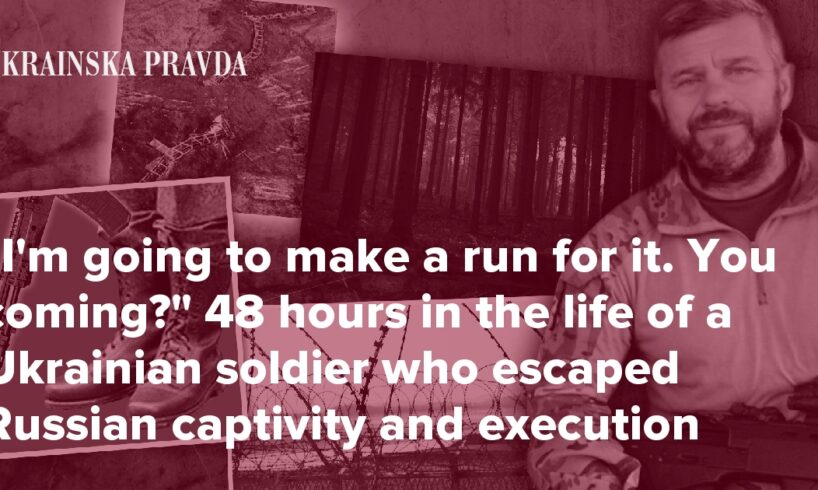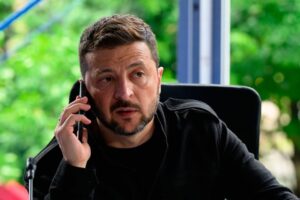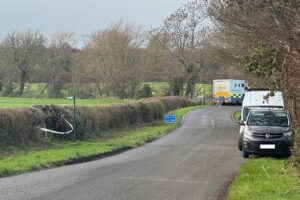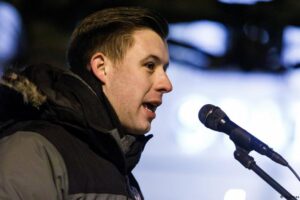
It was a warm June morning, and Anatolii Osukhovskyi, a chief sergeant in the Armed Forces of Ukraine, was lying on the ground with his hands tied, pinned down by a heavy log, awaiting his execution. This memory will stay with him for life.
Minutes earlier, it had all seemed like a long, feverish dream. Everything had happened so fast, as if a film editor had cut and spliced his life. One moment Osukhovskyi was walking through the forest, the next, click! – a rifle barrel was pressed to his temple, and click! – there was dry earth against his cheek, a log at his back, and the boots of a Russian soldier in front of him.
Osukhovskyi raised his head and looked the guard in the eye.
Advertisement:
“Don’t stare at me!” the guard shouted. That was the moment Osukhovskyi realised that he and his brothers-in-arms were going to be executed.
He clenched his teeth and began to pray silently. But he didn’t beg for a miracle to save his life. He didn’t ask for the salvation of his soul. He didn’t plead for a death without torture. He prayed for an idea. One good idea – how to escape.
In the defining moments of life, when faced with the harshest trials, a stormy wind strips away all the husk from a person, leaving only the core: the steely answer to the question of who you really are.
Anatolii Osukhovskyi, 56, has been a man of action his entire adult life.
In high school, he worked out with weights to prepare for military service. When the Soviet system called him to fulfil his “internationalist duty”, it sent the 18-year-old Master of Sport into the rocky deserts of Afghanistan.
As a young man, he started his own business. When a spike in the dollar rate bankrupted him in the mid-1990s, he didn’t despair. He packed a bag and went to work in the United Kingdom. He worked hard, paid off his debts, and after eight years, he started his own construction company.
In February 2022, Osukhovskyi had booked an expensive hotel in the United Arab Emirates and was planning to go on a dream holiday with his family. But on the morning of 24 February 2022, a friend of his called and said three words: “We’re at war.”
So instead of boarding a plane to Dubai, Osukhovskyi bought an off-road vehicle and military gear and went to defend Ukraine. He and his two brothers joined the same unit. His alias was “London”.
And now, three years later, at the most terrifying moment of his life, he had no intention of patiently awaiting his fate.
Advertisement:
“The harshest attack of the war for me”
If a soldier’s gospel were ever written, it would begin: “In the beginning was the order.”
In the beginning was the order. And the order was simple: to go on duty.
On 3 June this year, “London” and two of his brothers-in-arms took an automatic mounted grenade launcher and four boxes of ammunition and headed to their position.
The observation post was on the edge of a forest, with a field stretching ahead. Three kilometres away, on the other side of the field, was another forest – Russian-controlled. There was one fortified dugout, and within half a day the soldiers had dug another.
“Am I a risk-taker? Yes, probably. But before the war the biggest risk I took was investing money in business,” Anatolii Osukhovskyi says
All photos provided by Oleh Osukhovskyi
They might have remained unnoticed had it not been for their next order: to launch an attack according to the coordinates specified. The soldiers fired four shots at the target and camouflaged the grenade launcher.
“They must have identified us by the sound,” Osukhovskyi said. “And the response was immediate: about 25-30 metres away – for a 120mm mortar that’s very accurate. We hid in the dugout. Counted 12 hits. Then a bomb was dropped, hitting the dugout; the three of us fell to the ground. It was one of the heaviest attacks of the war for me.”
All three were concussed, “London” the least. He helped his brothers-in-arms get up, and they rushed to the other dugout. As they were running, a Russian FPV drone hit their grenade launcher and the ammunition began to explode.
The second dugout was small, with barely enough room for the three of them. As they sat there, the soldiers counted another 12 mortar rounds.
When the attack had died down and they could peek outside, the soldiers saw that the main dugout was totally destroyed. They decided to retreat.
Advertisement:
A neighbouring unit’s mortar team was 2.5 km away. The group there reported the situation and the fact that the soldiers were severely concussed. They had to wait for nightfall before they could begin the evacuation.
That could have been the end of the story – and you would never have heard about it. But some time later, the soldiers received another order: to return to different positions and support their neighbours.
“The guys were feeling really bad. They were concussed and vomiting. But we decided to obey the order. When we set off, the guys’ faces were white,” Osukhovskyi says.
They set off in the early dawn, when the sky in the east was just turning silver with the first rays of the sun and there was a sharp smell of damp earth in the air.
They walked, and walked, and walked. Three men with rifles. “London” brought up the rear.
On and on they walked. They didn’t notice the first Russians lying in wait. But when they reached the second lot, suddenly about ten men seemed to appear from underground. Before Osukhovskyi even had time to raise his rifle, he was looking down the barrel of a Russian gun pointed at his face.
That was how he was captured.
Chocolate in captivity
Osukhovskyi’s group was not the only one staring down rifle barrels that morning.
As he lay tied up, racking his brains for ideas of how to escape, the Russians kept bringing in new prisoners. They recorded their names and units on video and shoved them to the ground. Before long there were ten of them.
There should have been twelve. But two Ukrainian soldiers were interrogated and then led deeper into the forest. A minute later came the sound of gunfire rattling. Osukhovskyi never saw them again.
Were they executed? Does a person have the heart to say that if there is even a tiny chance of a miracle?
“Some time passed, and then one of the orcs glanced at another one and said to us: ‘If you behave, maybe you’ll live,’” Osukhovskyi recalls.
When the prisoners’ hands were untied, he realised: those who were left would not be killed, at least not yet. But thoughts of escape never left him. Now it was as if fresh fuel had been injected into his engine, and his mind began racing even faster.
“London” got his first idea when he asked to take a leak. The spot they allowed him to go to was cut across by a deep ravine – a perfect escape route, far safer than the open forest.
Half an hour later, Osukhovskyi said he needed to take another leak. There were three guards watching them at the time. One of them could be ruled out: he was about 20 metres away in the bushes, looking in the opposite direction.
“I was going to jump into the ravine and make my way along it. I thought they wouldn’t chase me because they had nine other people to guard. And the one who was 20 metres away – by the time he got to the ravine, I figured I’d be gone among the trees. In short, I thought I had a chance.
With one foot, I was ready to start my escape. And then I saw another group come out across the ravine, about 50 metres away. Six men. They’d clearly hear the guards shouting and see me from above. There was no chance of escape.”
Osukhovskyi with one of his brothers-in-arms at their position
Osukhovskyi went back to the other prisoners. The next idea that came to him was for everyone to coordinate and, at a signal, attack the guards. But that idea, too, was stillborn – the prisoners were forbidden to talk to each other.
Osukhovskyi did not comply with this order, however. Returning from the toilet, he sat down next to a soldier from another unit. There was little hope for his brothers-in-arms from his own group – they felt too bad after yesterday’s concussions. So London edged closer to the man beside him and whispered: “Shall we attack?”
Of course the risk was enormous and some of them would be killed. But, Osukhovskyi pondered, some of the prisoners would still be able to escape.
Advertisement:
But the man looked at him wide-eyed and moved away. And then London realised: he would have to organise it all himself.
“They [the Russians – ed.] pushed this kind of propaganda: ‘You know, we’ll take you prisoner now and feed you chocolate, because when you’re our prisoner they even give you chocolate’,” he recounts. “‘You can have a shower there, because we have showers. It’s not like with your guys, where you abuse our guys. With us it’s all totally different.’”
They tried to make us listen to them and do everything they said. And I think it worked on some of the lads. They got what they wanted out of them.
A couple of hours later, an order came through to move the prisoners deeper into the territory. And it became clear that the window of opportunity for escape was narrowing sharply.
Escape
What’s the most important thing when you decide to escape? That your hands are free. And although Osukhovskyi didn’t have a plan of action yet, he understood this point very well.
The prisoners were told that they would be moved along a path through a minefield. The distance was 2.5 km.
When they started tying the prisoners’ hands again, London pretended he was exhausted.
“I was second to last. When it was my turn, I said: ‘Guys, I’m 60 years old, I have a knee injury, I have concussion, and I’m in no state to manage these two and a half kilometres.’ And they said: ‘All right, we won’t tie you up.’
The man behind me was 52, and he asked them not to tie him up as well. And this orc said to him: ‘All right, you two run together at the back and help each other.'”
There were three Russian guards at the head of the column and one bringing up the rear.
The prisoners were ordered to keep a distance of no more than two metres. That would have been possible if it had been a slow walk. But in reality, some of the soldiers set a fast pace and pulled ahead, while others were out of breath after two hundred metres and slowed to a walk.
So, Osukhovskyi reasoned, they were in the middle of a minefield, with grass up to their chests, and only one armed guard behind them.
During his time in captivity he had run through a dozen possible scenarios in his head. Most of them involved knocking the nearest soldier off his feet. And now fate had arranged it so that there was no need to attack anyone. All he had to do was not lose the moment.
He caught up with one of the brothers-in-arms he’d been captured with and said: “I’m going to make a run for it. Are you coming?”
The man turned, and his face was as pale as a hospital sheet. And London realised he’d be running away alone.
Anatolii Osukhovskyi in hospital with his younger brother Oleh
He took one last look back: the nearest prisoner was about forty metres away. Then Osukhovskyi ducked and dived into the grass. He set off on all fours at incredible speed. Fifty metres in a few seconds – first one way, then the other. He watched from a distance as the guard ran past.
Advertisement:
London decided: now they’d count them, notice someone had escaped and start sweeping the field with bullets. So he curled himself into a position that would minimise the harm if he was shot.
But no one fired across the field. Probably they only discovered they’d lost a prisoner at the end point.
“I crawled to the halfway point of the field – that’s about 2.5 km. If I’d gone straight back, the route would have been much shorter, but I decided they would’ve already radioed about my disappearance, and they’d have been waiting for me.
Then I saw a forest – a long way away; later our drone pilots worked out it was 5-6 km away.
Now, I probably wouldn’t have crawled that far by this route – because the field was mined. I came across three or four mines, but they were all heavy, anti-tank ones. I didn’t see any anti-personnel mines, although I know they were there too.”
Bearer of others’ secrets
His knees burned as if stuffed with broken glass. Many times it seemed to him that he simply didn’t have the strength to crawl any further. His path was too hard. Several times he caught himself thinking he wanted to rest until dawn.
“There was a moment when I lay down under some bushes and covered myself with grass. And there was a light breeze blowing. And I felt so good.” This is London’s first warm memory from this story.
Twenty minutes of rest – that was all he allowed himself. Though his body begged for more, a thought nagged at his mind – he just had to reach his guys by nightfall. It was all because of the secret he carried with him.
When Osukhovskyi had been lying on the ground, a prisoner, he’d heard the Russians exchanging plans. And he’d found out that that night, another sabotage group was planning to enter the positions where the Ukrainian FPV pilots worked to catch them off guard. He was even friends with some of those pilots. And once they’d deprived the Ukrainians of their eyes in the skies, the Russians planned to go on the offensive.
So you gotta keep moving, the fighter told himself. Doesn’t matter about your knees, you have to reach them and warn them about the impending mop-up.
When the grass and bushes gave out, Osukhovskyi simply stood up and ran, if you could call it running. From time to time he raised his hands so that if anyone saw him they wouldn’t shoot him. He had no idea whose positions lay ahead – his own or the enemy’s. He only knew which direction the Ukrainian forces were in.
At last a wall of barbed wire rose before him. Too high to jump. But in one place he found a gap where someone had cut the wire. He crawled through it and came out straight into trenches. With people in them.
Advertisement:
It was as if a thin thread inside him snapped. All the way he’d been telling himself that he had to reach his guys by nightfall. And that had meant making a detour and looking for a new way to the Ukrainian positions. But now the icy realisation swept over him that his strength was at zero.
Osukhovskyi began to crawl back to hide in the bushes so he wouldn’t be seen by the Russians. And suddenly he heard a few words in Ukrainian.
Even now, remembering that moment, his eyes fill with tears. Neither in the scorching sands of Afghanistan, nor on the rainy streets of London, nor when stepping off the plane that had brought him back to his homeland for the first time in a long while – never in his life had Osukhovskyi been so glad to hear his mother tongue.
And then he drew himself up to his full height, took a few steps forward, and shouted to the soldiers: “Glory to Ukraine!”
* * *
The journey to the hospital turned out to be difficult. It involved more dashes – from one observation post to another. Shelling so intense that it felt as if the mortar rounds were landing right next to you. And yet another concussion, coming to with water being poured on your face.
There were also conversations with the commanders. Osukhovskyi told them everything he had heard about the Russians’ plans. The UAV pilots and other soldiers had time to leave the positions that were to be attacked. And the assault troops and artillerymen learned where to look for the Russians. Later, in hospital, a wounded assault soldier told him they had found one of the groups Osukhovskyi had warned the command about and destroyed it.
For him, the war isn’t over. Although from time to time his wife asks: “Maybe you’ll let others fight now and come back yourself?” “What ‘others’?” Osukhovskyi replies. “Twenty-year-olds?”
And she says no more – she knows her husband’s stubbornness all too well.
Perhaps the expression “Hope dies last” was coined by people who lacked the strength to keep going until they reached their goal.
Author: Rustem Khalilov, UP
Translation: Yuliia Kravchenko and Anastasiia Yankina
Editing: Teresa Pearce





